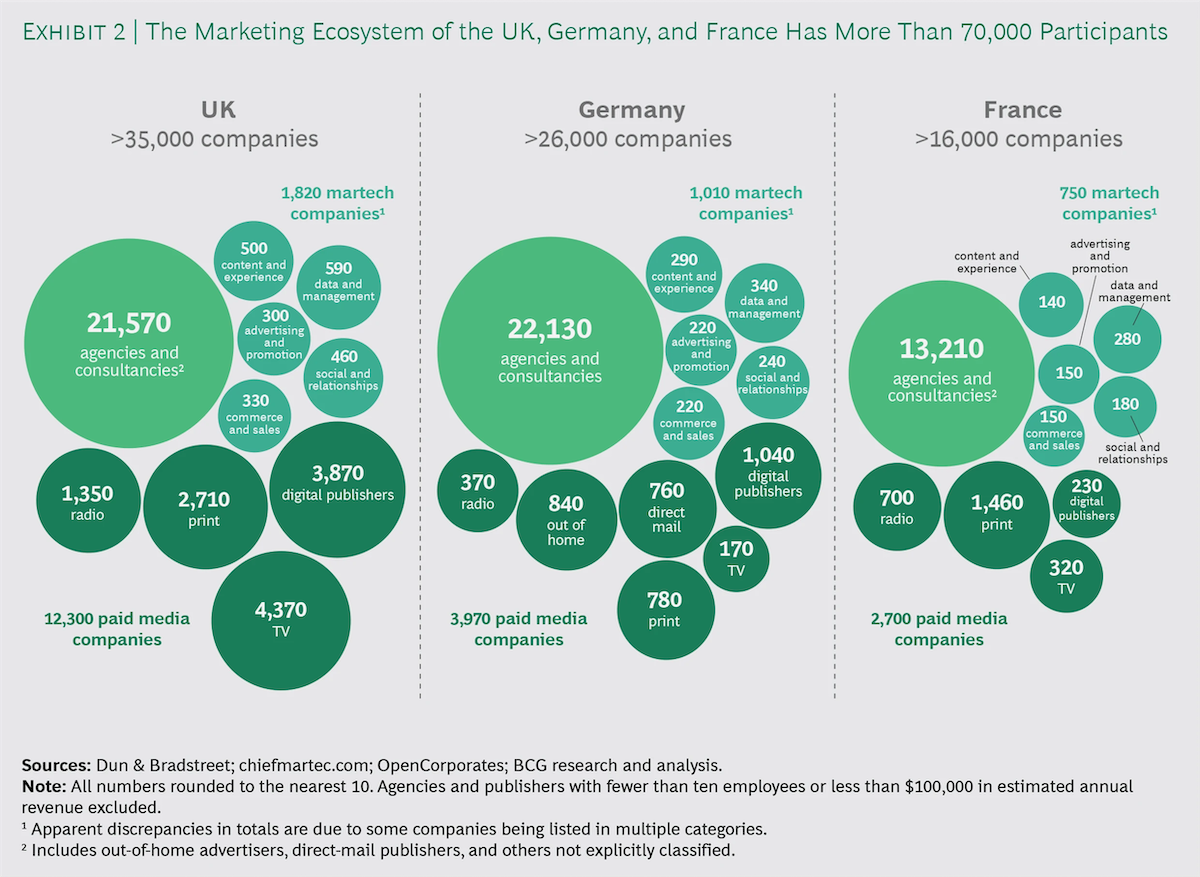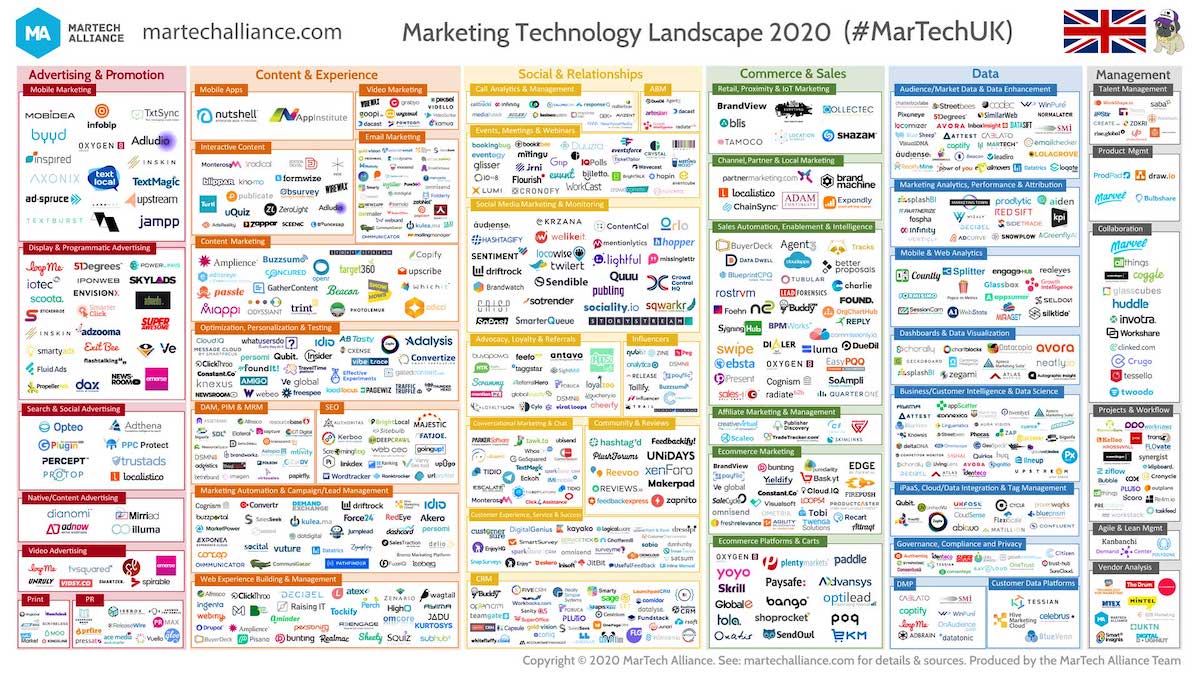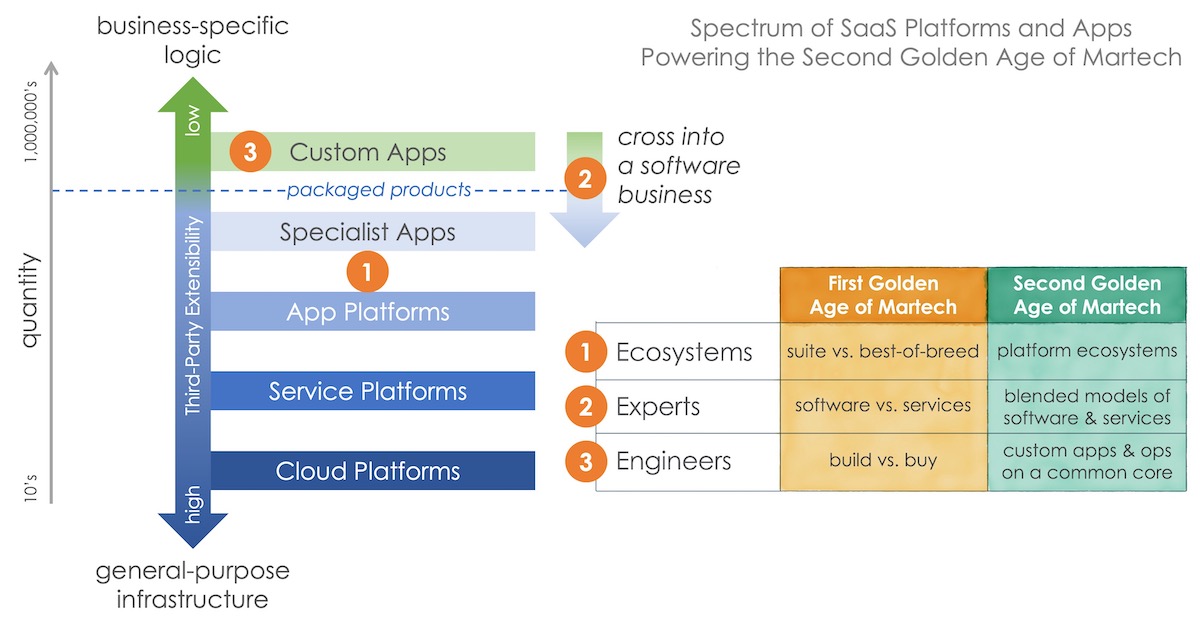The large size of the marketing technology landscape stirs many emotions in the marketing community. Excitement. Frustration. Awe. Anger. Yes, anger. Just last week, I was hotly accused by someone on LinkedIn of stoking FUD — fear, uncertainty, and doubt — simply by publishing it.
Those vehement reactions always surprise me. It’s just a count of martech companies, dude, arranged as clusters of logos on a slide. It’s not like Galileo telling the Church that the Earth revolves around the Sun.
Although maybe in some distantly analogous way it is. Empirical evidence that runs contrary to people’s worldviews — or the way they wish the world was — isn’t always received kindly. Hey, I get it. I appreciate that complexity and uncertainty can be uncomfortable. We crave simplicity and certainty. And the martech landscape offers neither.
But the Sun does not revolve around the Earth. And the only way we made it to Moon was by embracing the reality of what is, not what we wished to be. Physics is stubborn that way.
However, something else has always surprised about the fervent demand for consolidation in martech. Over the past two decades, I have almost never heard a complaint about the number of choices marketers have with agencies and consultants.
Yet the number of agencies and consultants serving marketers is an order of magnitude larger.
Why does one freak people out, while the other, larger one doesn’t raise an eyebrow?
The chart above is from a recent Boston Consulting Group article, Getting the Most from Europe’s Marketing Ecosystem. They analyzed martech, agency, and paid media companies in UK, Germany, and France. Collectively, there are more than 70,000 of them in just those three markets.
In the UK, they identified 1,820 martech companies — but 21,570 agencies and consultancies serving marketers. (And also 12,300 paid media companies.) Now, these aren’t necessarily all companies headquartered in the UK, but companies that are identified as operating there. (I believe this data was obtained based on public registration information for things like taxes.)
Of course, if you’re wondering how many martech companies are actually headquartered in the UK, you’re in luck. The answer is 714, according to the latest UK Marketing Technology Landscape produced by Carlos Doughty of Martech Alliance:
(Brace yourself for fiery feedback from geocentric adherents, Carlos.)
Think about that: the number of agencies and consultancies is more than 10X the number of martech companies in these countries.
Why isn’t that the story? Why isn’t the clamor for consolidation in services 10X louder than for martech consolidation?
Historically, for good reasons such as:
- Services never carried the weight of “investment” — they were just operating expenses.
- Service engagements tended to have easy, well-defined exit points.
- Services were seen as fungible — you could always swap out one agency for another.
- Marketers knew what they were getting when they hired an advertising or media agency.
- Marketers generally knew how to negotiate with and manage agencies effectively.
- Why? Many marketers had actually worked at an agency at some point in their career.
- The “creativity” of new, small, start-up agencies was seen as a plus.
A huge field of marketing services firms wasn’t scary. In fact, it was seen as a good thing.
Technology was almost the mirror opposite of that. It was seen as an investment. One rarely approached those investments with a planned exit. Once software was implemented, it was not easy to swap it out (“switching costs” and “lock-in” were common terms in the IT world).
Technology was often terra incognito to marketers: they didn’t know how these black boxes (the martech vendors and their products) worked. They weren’t experienced at negotiating with or managing them. Most had never worked at a tech company. The kind of “creativity” coming out of tech startups was something different. Like a fan of Romanticism paintings suddenly being introduced to Cubism, viewing the Mona Lisa side-by-side with Guernica.
This is the clash of cultures that I’ve spent a decade wrangling on this blog.
But it’s 2020 now, and the chasm between marketing and technology has closed — even if not everyone has acknowledged that yet. But the 10-years war between marketing and IT is over. Marketing technologists are an integral part of the marketing team. Marketing operations and technology management is now a pillar capability in the department.
Isn’t it time to reevaluate our worldview on software and technology in marketing?
Because it’s not just marketing that has changed. Over the past couple of decades, the cloud has completely reshaped the dynamics of the software industry. IDC has predicted that by 2023, “over 500 million digital apps and services will be developed and deployed using cloud native approaches.”
Over 500 million digital apps and services. Think about that.
While there is certainly consolidation in martech, especially around major platforms, software is eating the world with millions of apps and microservices that leverage the consolidation of those major platforms. Everything connects with everything else in the cloud. (Perhaps you’ve heard of the burgeoning “API economy?” It’s accelerating, not slowing down.)
Here’s the thing that’s really wild: many of the new apps and software services in the decade ahead are going to be built by services companies and brands themselves. Of the three mega-trends that I’ve argued will shape The Second Golden Age of Martech, the blending of software and services and the customization of digital businesses on top of common platforms are the two that turn marketers’ relationship with software upside down.
Marketers and agencies aren’t locked in battle against a burgeoning martech landscape. They are becoming part of the martech landscape. And by sheer numbers alone, it’s inevitable that they will dominate it within this decade.
Okay, pause for a moment.
If that grand new model of orbits in the heavens is giving you heartburn, or you’re thinking of metaphorically burning me at the stake on LinkedIn, let me leave you with three questions to ponder:
- Why are you relatively comfortable with the tens of thousands of marketing agencies and consultancies that you have available to you?
- What do you believe are the benefits of such a rich and diverse landscape of marketing services firms, with new ones continually emerging?
- If those services firms were delivering part (or all?) of their value to you through software — assuming such software integrated smoothly with your martech platforms of choice — would that increase or decrease the benefits they delivered to you?






